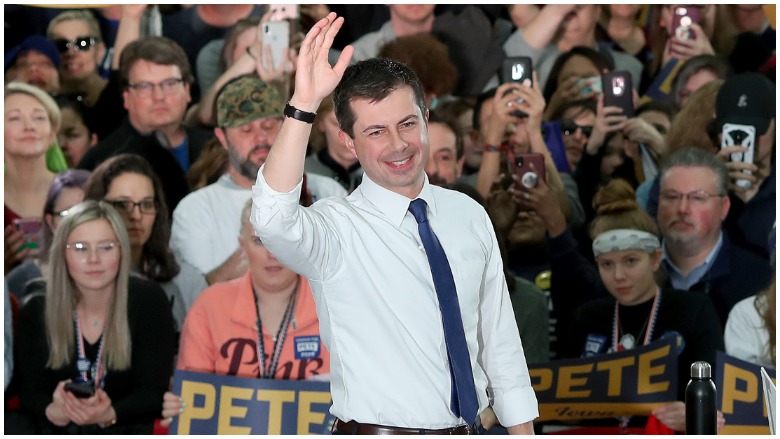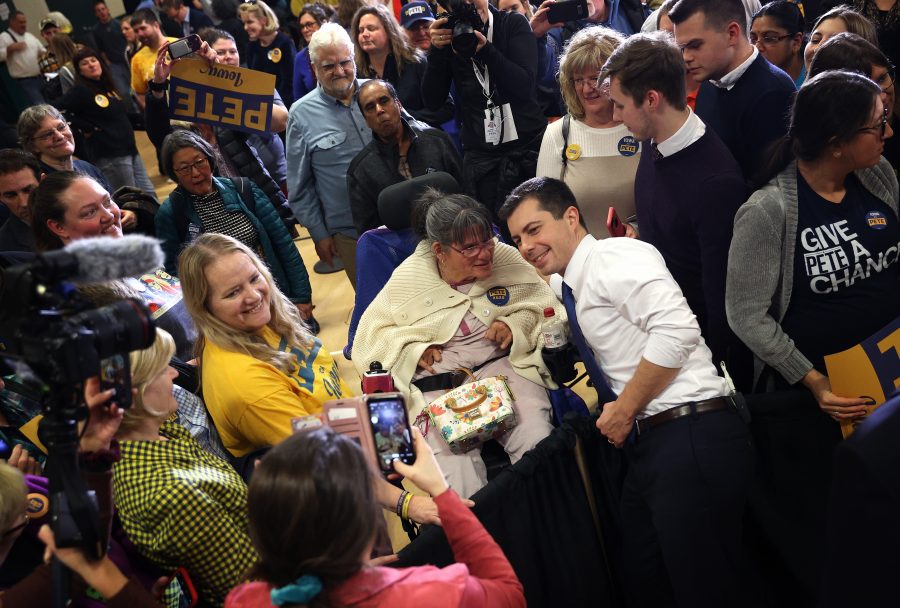
Pete Buttigieg took the stage to address supporters in Des Moines, Iowa amid the unexpected delay for results. He began speaking around 12:22 a.m. ET, hours after the caucuses had ended.
You can watch Buttigieg’s speech in the video below.
None of the Democratic candidates were able to officially declare victory in front of their respective supporters, but they all shared optimistic messages about their campaigns as the night dragged on without any winners announced. Buttigieg struck the same tone, acknowledging that while the results were not yet known, “we will be going on to New Hampshire victorious.” He praised Iowans for proving the skeptics wrong and propelling his campaign forward.
Buttigieg also pointed out his mother, Jennifer Anne Montgomery, in the audience, prompting excited cheers from the crowd. Buttigieg also praised his husband, Chasten, referring to him as “the first gentleman of the United States.” This moment inspired the crowd to chant Chasten’s name.
The Iowa caucuses officially began at 8:00 p.m ET but the state’s Democratic party delayed the release of the results due to reporting issues. Officials issued a statement around 11:30 p.m. that explained, “We found inconsistencies in the reporting of three sets of results. In addition to the tech systems being used to tabulate results, we are also using photos of results and a paper trail to validate that all results match and ensure that we have confidence and accuracy in the numbers we report.”
It was also reported around midnight that a manual count of the votes would be conducted.
Buttigieg Acknowledged the Day Before the Caucuses That It Was ‘Very Important’ That He Perform Well In Iowa
Pete Buttigieg appeared on CBS’ Face the Nation the day before the Iowa caucuses. Moderator Margaret Brennan asked Buttigieg about his expectations in Iowa and how he would define success in the first race. When she asked him if a successful night meant securing either the top or second-place spot, Buttigieg responded that he would “leave that to the pundits.”
But he also acknowledged that it was “very important” that he perform well in Iowa because the state could be a springboard. Buttigieg does not poll as well in future primary states, such as South Carolina and Nevada, as he does in Iowa and New Hampshire. “The process of actually proving that we can earn support, that we have the right kind of campaign organization, that we can turn folks out with enthusiasm, that starts right here tomorrow night and we’re very aware of that.”
Later in the interview, Buttigieg was also asked about his struggle, based on polls, to win support from minority groups nationwide. The former mayor countered that he is “newer on the scene” compared to the other candidates. He said that he feels other voters, especially in southern states, are waiting to see whether he will be “in a position to actually deliver” on his campaign plans, He again stressed the importance of Iowa as a chance to “prove” himself to a broader base of voters.
An Average Of Polls Before the Iowa Caucus Showed Buttigieg Trailing Bernie Sanders & Joe Biden

GettyPete Buttigieg greets members of the audience during a Get Out The Caucus rally February 2, 2020 in Coralville, Iowa.
Pete Buttigieg embarked on a busy travel schedule across Iowa, including less-populated rural areas, in the final weeks leading up to the caucus. His goal was to personally connect with as many individuals as possible because in the caucus system, that could make all the difference in terms of the final delegate count.
A candidate needs to obtain at least 15 percent support at an individual caucus site in order to be considered “viable.” If your chosen candidate fails to meet that threshold, then you have to move on to your second choice.
Iowa Democratic strategist Jeff Link told Politico that Buttigieg had created a “real opportunity” for himself by choosing to spend much of his time courting votes in smaller areas that may not see the other candidates as often. Link told the magazine, “there’s a real penalty in not being viable in those smaller precincts, especially when the race is so tight.” You can see a more detailed explanation of the Iowa caucus system and how it’s different from primaries in other states here.
In the final day before the Iowa caucuses, it remained to be seen whether the strategy would pay off. An average of polls from Real Clear Politics, taken between January 20 and February 2, showed Buttigieg in a statistical tie for third place with Senator Elizabeth Warren. Senator Bernie Sanders appeared to be the frontrunner heading into the night, with former Vice President Joe Biden close behind.
Real Clear Politics 2020 Polling Average in Iowa [1/20/2020-2/2/2020]
| Bernie Sanders | 23.0% |
| Joe Biden | 19.3% |
| Pete Buttigieg | 16.8% |
| Elizabeth Warren | 15.5% |
| Amy Klobuchar | 9.0% |
| Andrew Yang | 3.3% |
| Tom Steyer | 3.0% |
One of the biggest questions of the night focused on who voters would select as their second choice. As referenced above, a candidate needs to garner at least 15 percent support in order to be considered “viable” and secure a portion of the state’s 41 delegates up for grabs.
A poll from Emerson College, conducted between January 30 and February 2 among registered Democrats and Independent voters, showed that Buttigieg had the best chance to pick up possible votes from Senator Amy Klobuchar supporters. 23 percent of voters who said that Senator Klobuchar was their top choice named Buttigieg as their second choice. 41 percent named Biden and 26 percent said they’d switch to Sen. Warren.
By comparison, the poll showed that Buttigieg was far less popular among those who prefer Warren. 46 percent of Warren supporters said they would switch to Sanders if Warren was not viable. 25 percent said they’d switch to Klobuchar.
READ NEXT: Pete Buttigieg’s Family: 5 Fast Facts